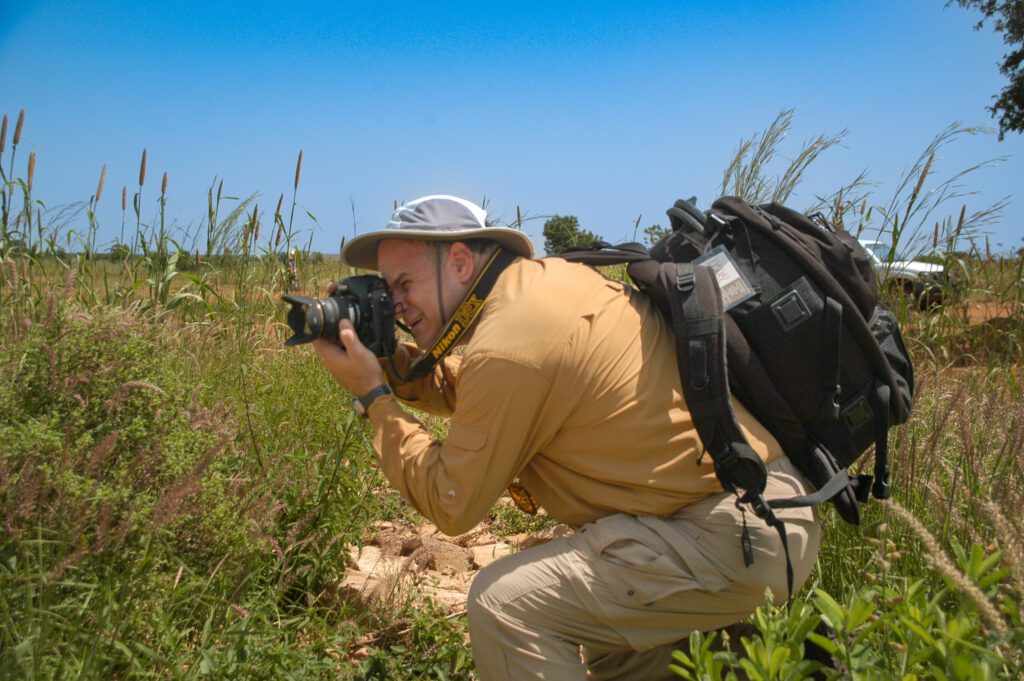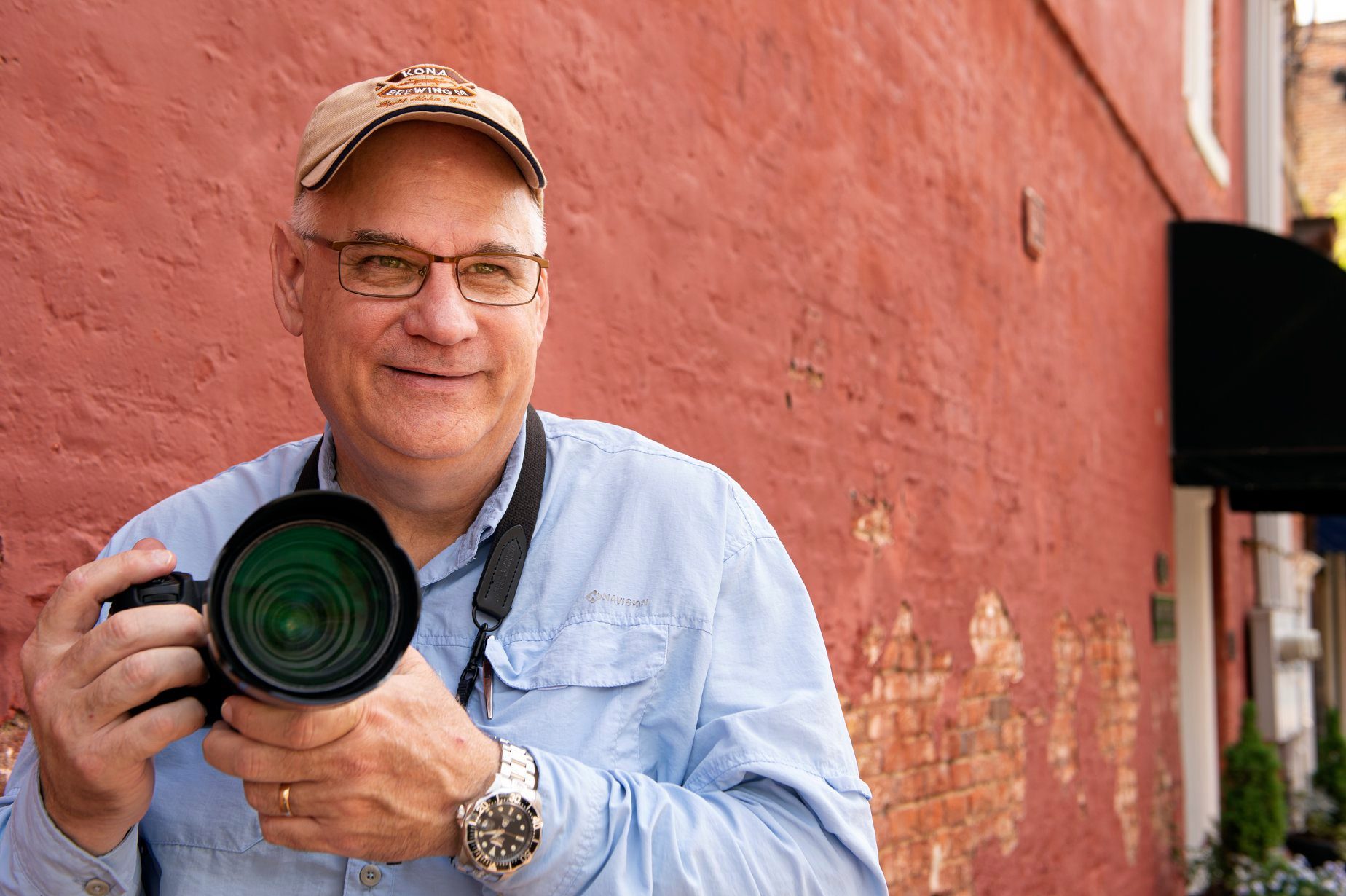Definition of Photojournalist
Photojournalism is a particular form of journalism (the collecting, editing, and presenting of news material for publication or broadcast) that creates images in order to tell a news story. It is now usually understood to refer only to still images, but in some cases the term also refers to video used in broadcast journalism. Photojournalism is distinguished from other close branches of photography (e.g., documentary photography, social documentary photography, street photography or celebrity photography) by complying with a rigid ethical framework which demands that the work is both honest and impartial whilst telling the story in strictly journalistic terms. Photojournalists create pictures that contribute to the news media.
–Wikipedia
Photojournalism: the job or activity of using photographs to report news stories in magazines or newspapers
–Merriam-Webster
This photo is from the East Carolina Buccaneer (college yearbook) 1984. That is me on the left. I was the darkroom manager back then. The other photographers are Mark Barber and Mike Smith in the top middle photo, and Gary Patterson, head photographer, center bottom and to the right Neil Johnson.
We all shot for the school newspaper and the yearbook as “photojournalists.”

Here I am, shooting in 2005 in Burkina Faso, and I still consider my work to be as a photojournalist. I was shooting for a Christian organization showing their work. It was to be used in materials for a fundraising program they did every year.
The choice of words you use to communicate can make all the difference in the world.
“Language shapes our behavior and each word we use is imbued with multitudes of personal meaning. The right words spoken in the right way can bring us love, money and respect, while the wrong words—or even the right words spoken in the wrong way—can lead to a country to war. We must carefully orchestrate our speech if we want to achieve our goals and bring our dreams to fruition.”
—Dr. Andrew Newberg, Words Can Change Your Brain
Client-Centered Communication vs. Self Centered
Communications
If people find out I went to seminary, they want to know what church I pastored or where I pastored. So you see, there are assumptions made by the words I use with the audience.
Writers have always known that the right word can evoke so much more than just any synonym would do.
According to Compton’s Encyclopedia, the English language contains some 500,000 words. Yet the average person’s working vocabulary consists of 2,000. And the number of words we use most frequently that make up our habitual vocabulary? For most people, it averages 200-300 words.
According to Oxford University and the PBS series ‘The History of English’:
William Shakespeare used a total vocabulary of just over 24,000 words. In 2003 16,000 of those words were “obsolete.”
Edgar Allen Poe used a total vocabulary of under 18,000 words. In 2003 9,550 of those words were “obsolete.”
Is the word photojournalist obsolete? No, but if you are trying to communicate your value to a client, using this word can create a hurdle or obstacle.
While you may see yourself as a photojournalist and understand fully what that means and that it doesn’t mean you work at a newspaper but rather the approach you take, that is great and maybe even 100% accurate.
Now take in your audience, who you are trying to convince you are the person to help them tell their story.
I have started to use the descriptor Storyteller because this explains what I do, and clients can see the need for a Storyteller much faster than they can see the need for a photojournalist.
Another term similar to the Storyteller that you might like is Narrative.
Humanitarian Photographer
For me, the descriptor “Humanitarian Photographer” is too limiting. This tends to describe one as working with NGOs and nonprofits. While a corporation might look for a “Humanitarian Photographer” if they are trying to brand themselves as compassionate and that they give back, it is most likely not what they are going to look for when they need to tell the story of their product and how it is transforming people’s lives.
Examples of photojournalists not working.
I am a member of Christians in Photojournalism. When people write to join, many in the past have asked what newspaper they work for today. It would be best if you worked for a newspaper to be a photojournalist or part of our organization.
As many members have lost their jobs with newspapers, their identity as a photojournalist didn’t change. So they are still doing in their minds photojournalism for mission groups, NGOs, and even the corporate world, but telling accurate and truthful stories.
When I talk to people who do storytelling about Christians in Photojournalism, you can tell many have a look on their faces that I don’t work for a newspaper.
For the past 20 years, I have helped staff the Southwestern Photojournalism Conference. Some attendees get very upset if the speakers are not working for a news organization. Some speakers have shared how they are helping pay their bills by doing photojournalistic weddings.
What we call the “Day In the Life” photo story is how many former photojournalists see themselves doing by covering weddings. Many have gone on to help protect water projects or other things like Habitat for Humanity worldwide and show this as their “photojournalism.”
The disconnect in both of these examples is those who could participate do not see themselves as photojournalists. Instead, the title to them means news organization photographer–not a storyteller in the broader sense.
Don’t become Obsolete.
If I continue to use the term photojournalist to describe myself, I will soon become obsolete because the word is not used the same with my audience as I use it.
Everyone, not just photojournalists, must be less self-centered and client-centered to avoid becoming obsolete. What words in your client’s vocabulary best describe you?
The power of made-up words cannot be underestimated either. My friends Dave Black and Zack Arias are great examples of creating new words. Dave talks about “silhouette reveal” verses “fill-flash.” Zack often makes up words for pieces of equipment in his demonstrations. Then he will say if you call up B&H and ask for a Big Bertha, you might not get what he was using.
Remember you are trying to connect with your audience to get hired. So figure out their vocabulary to help them quickly understand your gifts and talents.


